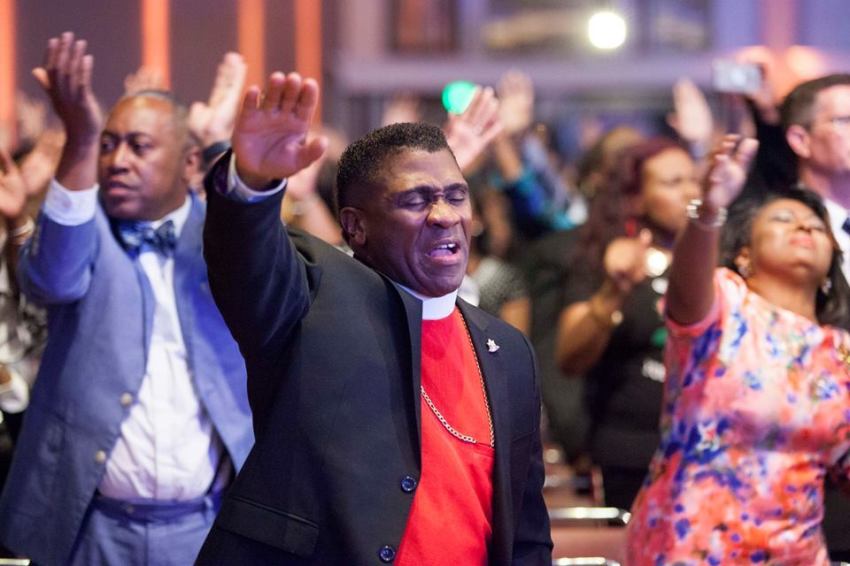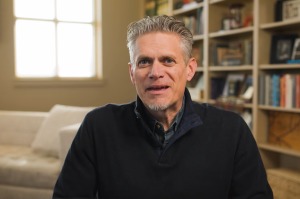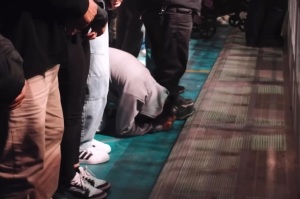Black men who attend church frequently more likely to be obese, study finds

Black men who attend church services frequently are nearly twice as likely to be obese than those who never attend services, according to a study by Duke University researchers.
The study, “Investigating Denominational and Church Attendance Differences in Obesity and Diabetes in Black Christian Men and Women,” from Duke’s Samuel DuBois Cook Center for Social Equity, also suggested that the development of obesity in black men highly engaged in church life could be influenced by their social networks.
Social networks in this case refers to a “web” of relationships among individuals.
A lower prevalence of diabetes among Catholics and Presbyterians was also noted when compared to groups such as Baptists, Pentecostals, Methodists and other Protestant groups. This discrepancy, however, might have been impacted by a slight difference in the age group of the subjects studied.
Researchers say these key findings now need to be factored into faith-based health promotions since obesity increases the risk of developing cardiovascular disease and diabetes.
The study was conducted using data from the National Survey of American Life to investigate the correlation between the faith traditions and health outcomes for more than 4,300 African American and Afro-Caribbean Christians.
“Our analysis of NSAL data found no denominational differences in obesity, but did observe an interaction between gender and the frequency of religious service attendance that greatly increased the likelihood of obesity in men, but not women,” lead author of the study, Keisha L. Bentley-Edwards, and her colleagues wrote.
The associate director of research and director of the health equity working group at the Cook Center, who is also an assistant professor of general internal medicine, further wrote with her colleagues that “church engagement is an important factor in obesity for black men.”
“Concerning diabetes, lower odds emerged among Presbyterians and Catholics compared to Baptists. No interaction between gender and religious service attendance was observed for this outcome. This finding indicates that the odds of diabetes do vary between denominations within the black church and communicate the importance of considering denomination in health promotion and prevention efforts that target blacks,” the researchers said.
While diabetes is the seventh leading cause of death among Americans in general, researchers note that among blacks alone, it is the fifth. And while one third of all American men and women have been classified as obese, among African Americans alone that rate is 48.4%, the National Health and Nutrition Examination Survey says.
“Historically, black churches have been a source of spiritual and social support, but greater religious engagement must also support good health behaviors,” Bentley-Edwards told Duke Today. “Both men and women who are active members of their churches are being pulled in a lot of directions outside of their faith community, which can make self-care a lower priority than what is warranted. We want them to make faith and health priorities in their lives, rather than faith or health.”
While the study highlighted the need for additional research focusing on the health outcomes of African Americans by denomination, it was noted that a recent review of studies examining the correlation between religion and weight found that Seventh-Day Adventists had the lowest body weight.
“Studies of health outcomes among Adventists, a Protestant denomination whose doctrine mandates abstinence from alcohol, tobacco and pork consumption and prescribes a vegetarian diet, reveal links between religion and health,” the authors said.
While adherence to this lifestyle prescription varies among black Adventists, studies show that obesity was higher among Adventists who ate meat. Obesity was also shown to be more prevalent among black Adventists compared to whites, the authors said.
“This may be due to blacks' entry into the Adventist faith later in life than whites, leading to later adoption of the dietary pre- and proscriptions and later intergenerational uptake of Adventist practices,” they added.
In a discussion of their findings, the authors of the study suggested that one explanation for the prevalence of obesity among black men highly engaged in church life could be their social networks.
“The present study’s findings among black men may reflect social networks differences between men who are and are not highly engaged in church, which can impact obesity development,” the authors said.
The authors pointed to research showing that beyond the age of 32, obesity can be transferred among individuals.
“Developing obesity was seen among siblings and spouses if one person became obese. Among friends, if one became obese, the other had a 57% increased chance of also becoming obese. Male same-gender friendships showed an increased chance of becoming obese when one friend enters that weight group,” the researchers noted.
The study further pointed to gendered roles within the church social context to provide an explanation for the high obesity rate among black men highly engaged in church life who are more likely historically to be involved in leadership.
“Distinct church roles may also encompass distinct, taxing responsibilities for black men and women within and outside of the church. Perhaps a factor in our findings is the superwoman role, a liability and asset-laden phenomenon describing black women’s stress-coping response and its connection to adverse health outcomes like obesity,” the authors contend.
“In the superwoman role, the challenge of being both black and a woman can lead to overwhelm, stress-related behaviors and deprioritization of self-care. Religion and spirituality are inherent in the superwoman role as black women draw strength and resilience from religion and spirituality—a central facet of their lives,” the authors continued.
“In our sample, the black men who have obesity and frequently engaged in the church may embody a ‘superman role,’ experiencing overwhelm from church and other social contexts that undermine self-care, promote obesity and other adverse health outcomes,” they explained.



























